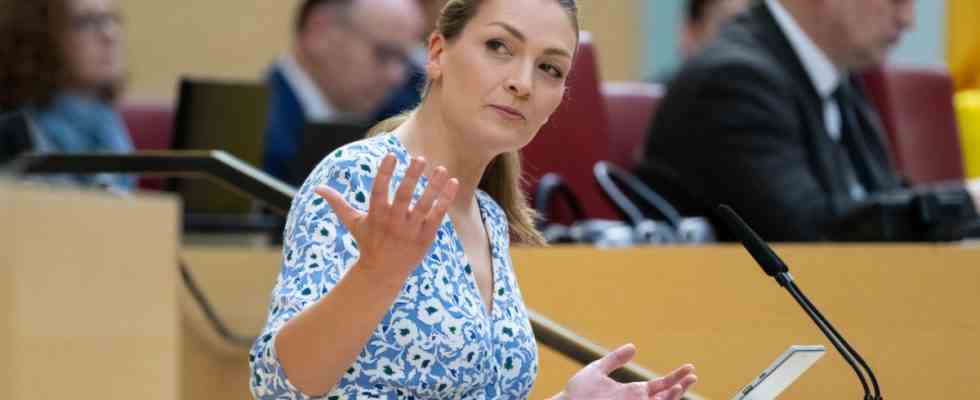Judith Gerlach begins on the big stage with everyday life: with her in the family. The daughter of the Bavarian digital minister just got her first milk tooth, she says. And when the question came up when that was with her, the girl said: “Then google it in your head.” Or the son, when she started school she thought: Half of these children will later “work in jobs that we don’t even know about today”. Not only today’s youth grow up in a highly digital world, but digitization affects everyone. It is therefore the duty of politicians to shape this future, says Gerlach and quickly sounds like Markus Söder: “We in Bavaria are not followers, we are leaders.” So lead, don’t follow.
Just as in their entire government statement on Wednesday there are sentences that could have come from the prime minister’s vocabulary: “ignite Bayern turbo”, again and again “high-tech and home”. She says: “Others just talk, set up circles of chairs, we deliver.” Lucky that Söder arrives in the plenary hall after a few minutes of sitting, before you had asked yourself: Is his chair empty today of all days? Gerlach picks up on the arrival of the boss and addresses a few slogans to “dear Markus”. She is currently drawing a tangent from Franz Josef Strauss and Edmund Stoiber to Söder, industrial location, high-tech, research location. All of this is a “huge benefit for our innovation ecosystem”, the best conditions for Bavaria to play a pioneering role in digitization. “But we have to stay on the ball.”
For the first time since her appointment to the cabinet in 2018, since Söders founded the department, Digital Minister Gerlach has made a government statement. It’s about the Digital Plan Bavaria, an overarching strategy for the digital transformation of the Free State and for the next ten years, which the Council of Ministers decided a week ago. A plan with around 200 measures for which around half a billion euros have been deposited in the 2023 budget.
Gerlach says that these are often “not the fancy, aloof topics, but we concretely improve people’s everyday lives”. A few highlights: For digital newcomers, such as seniors, contact points for questions about smartphones and the Internet are being set up in 30 municipalities. How do you book a doctor’s appointment online? The advice desks should deal with such things. To promote further vocational training, the ministry brings companies on board via an alliance. State-of-the-art vocational training centers in the trades, new learning media in schools, a virtual campus for administrative staff, impulses for municipalities so that digital administrative procedures become “as easy as online shopping” – Gerlach’s tenor is “End the paperwork”. And yet: For the fact that a declaration for the future has been announced, the view goes back very much. In the form of lavish praise of their own government.
After Gerlach, it’s Katharina Schulze’s turn, leader of the Greens. Her counter-speech is less than two minutes old when Söder rises from his Prime Minister’s chair, demonstratively disinterested, and slides five places to the right, next to Gerlach. He stretches out his hand, congratulations, the boss is obviously satisfied with his minister. Meanwhile, Schulze raises the fundamental criticism of the digital ministry. “It’s small, it has little money, little authority and little power.” She sees the responsibility less with Gerlach than with Söder, who “failed to set up a clear digital strategy and that is now taking revenge”. Fiber optic cabling, digital education, digitization and climate protection, Schulze lists what she thinks the Prime Minister has overslept. But Söder doesn’t listen, he chats, jokes and laughs with Gerlach and Finance Minister Albert Füracker. And before Schulze has finished her speech, Söder has walked out of the hall again. He was a few minutes late, but now he’s leaving earlier.
Gerlach’s digital plan? Bottom line, Schulze says, only warmed up, nothing new. Gerd Mannes put it almost exactly the same wording. The AfD politician thinks the minister could have saved herself the speech “due to the lack of concrete content”. The state government is talking about digital sovereignty, but in reality Bavaria has long been dependent on the digital companies in China and the USA. Volkmar Halbleib (SPD) speaks of a “minister without a country” without the power to implement it. This was covered in the government statement with “cloudy formulations and speech bubbles”. It was a scandal that the opposition’s digital plan was not available before the debate. Helmut Kaltenhauser (FDP) is also outraged. And in the minister’s work, “nothing has really caught on,” there are only “evocations of the future.” One reason: the “thankless department layout”.
After the debate, the minister seemed quite content, biting into a banana in front of the plenary hall, food for the nerves. She also had no lack of support in the plenum, it came in speeches from free voters and the CSU, for example from ex-transport minister Kerstin Schreyer. She lists the term “think tank” for the Digital Ministry: a think tank. And she once again emphasizes one thing emphatically: the traffic light just didn’t get its own ministry for it. Söder should like all of this.

